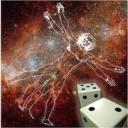Yahoo Answers is shutting down on May 4th, 2021 (Eastern Time) and beginning April 20th, 2021 (Eastern Time) the Yahoo Answers website will be in read-only mode. There will be no changes to other Yahoo properties or services, or your Yahoo account. You can find more information about the Yahoo Answers shutdown and how to download your data on this help page.
Trending News
Creationist Evolution?
Creationists, especially Young Earthers, say they believe in a circumscribed form of evolution that does not include the formation of new genetic information or the appearancee of new "kinds". I suggest this should be called Creationist Evolution and defined as;
Creationist Evolution = a change in allele frequency in a population over time
Should we make this a definition?
8 Answers
- QuestionerLv 75 years agoFavorite Answer
Maybe it would be helpful to make that distinction (creationist evolution).
I believe Dr. Terry Mortenson is correct: “Natural selection is the God-designed method of preserving representatives of the original created kinds” (Was Darwin Right?).
Creationists believe in natural selection and even “speciation.” Natural selection is a logical process that anyone can observe and it was actually a Creationist named Edward Blyth who first wrote about it. Blyth published some articles describing the process of natural selection in The Magazine of Natural History between 1835 and 37—over 22 years before Darwin published his book (he just didn’t come to the same conclusions as Darwin).
What Creationists believe, based on observational science and the Bible’s teaching, is that animals only reproduce after their “kind”—a taxonomic division generally broader than “species” (somewhere in the “family” or “genus” range). For example, all of the different dog species came from the dog kind (the canine family—canidae).
And we can do a lot with artificial selection, but there are limits. For instance, you can’t breed a dog to the size of an elephant, much less turn it into an elephant. As the biologist, Dr. Ray Bohlin said, “For essentially every trait, although it usually harbors some variability, there has always been a limit. Whether the organisms or selected traits are roses, dogs, pigeons, horses, cattle, protein content in corn, or the sugar content in beets, selection certainly has an effect. But all selected qualities eventually fizzle out. Chickens don’t produce cylindrical eggs. We can’t produce a plum the size of a pea or a grapefruit. There are limits to how far we can go” (The Impotence of Darwinism).
There certainly seems to be a permanence of kinds. As zoologist Dr. Walter Veith has said of the fruit fly that’s been bred and mutated and bombarded with so many evolutionary processes (and we’ve produced all these different varieties and characteristics and deformities): “Nevertheless although bizarre forms have been created, the barrier, which constitutes ‘fruit flies,’ has never been broken.” Earlier he explained it like this, “Perhaps we can liken it to a piano; the keys on the piano are the genes, and the sequences in which the keys are played (the genes activated and expressed) provides the music (the variants). How many tunes can be played on the piano? An unlimited number, and therefore no two tunes need to be the same. However, one is restricted to piano music (the kind), and if one should wish to hear a different kind of sound one would have to play another instrument such as the violin” (The Genesis Conflict).
They have great variability and adaptability, but they are still dogs, fruit flies, and bacteria. And oh how they love to point to bacteria. But as Dr. Carl Wieland (who has degrees in medicine and surgery) has said, “Bacteria actually provide evidence against evolution. Bacterial populations multiply at incredibly high rates. In only a matter of a few years, bacteria can go through a massive number of generations, equivalent to millions of years in human terms. Therefore, since we see mutation and natural selection in bacterial populations happening all the time, we should see tremendous amounts of real evolution happening. However, the bacteria we have with us today are essentially the same as those described by Robert Koch a century ago. In fact, there are bacteria found fossilized in rock layers, claimed by evolutionists to be millions of years old, which as far as one can tell are the same as bacteria living today” (Superbugs Not Super After All).
They are great at adapting to their environment (like becoming resistant to antibiotics or altering their diet), but they are still bacteria, and don’t change in their fundamental nature. And no matter what we do, they stay bacteria. We should have far more flexibility and plasticity under laboratory conditions than we actually do if Darwinian evolution were true. A good example is the work of Michigan State’s Richard Lenski on laboratory evolution of E. coli, which has shown trillions of bacteria evolving under selection for tens of thousands of generations yielding just broken genes and minor changes (in a word—more E. coli).
- AdamLv 75 years ago
"[A] change in allele frequency in a population over time" is the definition of biological evolution as it is understood by people who accept biological evolution to be true.
This definition does not distinguish actual biological evolution from the caricature of evolution that creationists think it is.
- Anonymous5 years ago
Ah, yes, the no new information BS. They never explain whether they mean an increase in information, or whether they mean novel information. The former is most certainly observed, and they never give an reasons why the latter can never occur. But then all they are doing is repeating creationist lies.
As for 'new kinds' not being observed, all they have done with this moving of the goal post fallacy is proven miracles do not occur. And if observation is the major criterion, they have just dismissed their religion as being without evidence, as no one has seen a dead man miraculously resurrected.
- 5 years ago
Sorry but in my opinion I think Creationism and Evolution do not go well together.
- How do you think about the answers? You can sign in to vote the answer.
- Anonymous5 years ago
Creationist Evolution?
Why not just call it Complete F***ing BoIIocks like the sane and rational amongst us?
Source(s): Scientist







